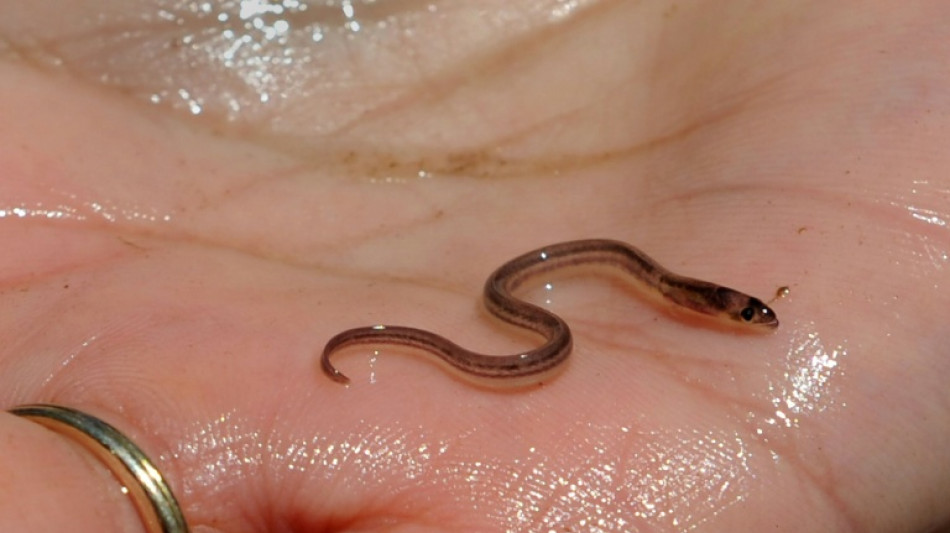
-
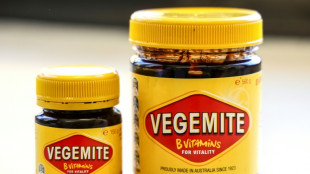 Loaf behind bars: Aussie inmate says Vegemite a human right
Loaf behind bars: Aussie inmate says Vegemite a human right
-
In film's second act, 'Wicked' goes beyond Broadway musical

-
 Asian markets track Wall St down with Nvidia, US jobs in view
Asian markets track Wall St down with Nvidia, US jobs in view
-
Scott Boland: the best 'spare' fast bowler around

-
 Fire and Ashes: England bank on fast bowling barrage in Australia
Fire and Ashes: England bank on fast bowling barrage in Australia
-
North Korea says Seoul-US sub deal will trigger 'nuclear domino' effect

-
 Education for girls hit hard by India's drying wells
Education for girls hit hard by India's drying wells
-
Haitian gangs getting rich off murky market for baby eels
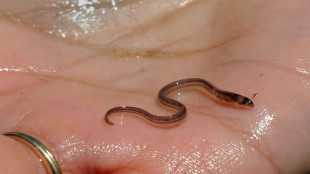
-
 Trump says will talk to Venezuela's Maduro, 'OK' with US strikes on Mexico
Trump says will talk to Venezuela's Maduro, 'OK' with US strikes on Mexico
-
Oscar Piastri wins Australia's top sports honour

-
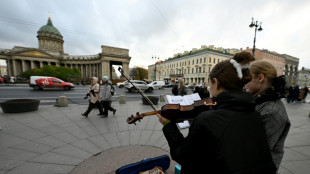 'Severely restricted': Russia's Saint Petersburg faces cultural crackdown
'Severely restricted': Russia's Saint Petersburg faces cultural crackdown
-
Polish PM denounces 'sabotage' of railway supply line to Ukraine

-
 UK toughens asylum system with radical overhaul
UK toughens asylum system with radical overhaul
-
LeBron back in training, edges closer to Lakers return

-
 Climate talks run into night as COP30 hosts seek breakthrough
Climate talks run into night as COP30 hosts seek breakthrough
-
Germany and Netherlands lock up World Cup spots in style

-
 Germany's Woltemade hopes for 2026 World Cup spot after scoring again
Germany's Woltemade hopes for 2026 World Cup spot after scoring again
-
Germany 'send message' with Slovakia rout to reach 2026 World Cup

-
 Trump unveils fast-track visas for World Cup ticket holders
Trump unveils fast-track visas for World Cup ticket holders
-
Netherlands qualify for World Cup, Poland in play-offs

-
 Germany crush Slovakia to qualify for 2026 World Cup
Germany crush Slovakia to qualify for 2026 World Cup
-
'In it to win it': Australia doubles down on climate hosting bid

-
 Former NFL star Brown could face 30 yrs jail for shooting case: prosecutor
Former NFL star Brown could face 30 yrs jail for shooting case: prosecutor
-
Fate of Canada government hinges on tight budget vote

-
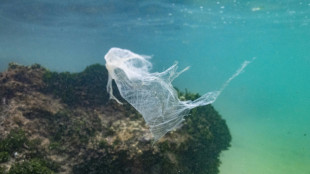 New research measures how much plastic is lethal for marine life
New research measures how much plastic is lethal for marine life
-
Mbappe, PSG face off in multi-million lawsuit

-
 EU defends carbon tax as ministers take over COP30 negotiations
EU defends carbon tax as ministers take over COP30 negotiations
-
McCartney to release silent AI protest song

-
 Louvre shuts gallery over ceiling safety fears
Louvre shuts gallery over ceiling safety fears
-
'Stranded, stressed' giraffes in Kenya relocated as habitats encroached
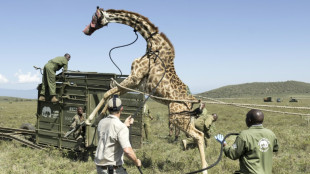
-
 US Supreme Court to hear migrant asylum claim case
US Supreme Court to hear migrant asylum claim case
-
Western aid cuts could cause 22.6 million deaths, researchers say

-
 Clarke hails Scotland 'legends' ahead of crunch World Cup qualifier
Clarke hails Scotland 'legends' ahead of crunch World Cup qualifier
-
S.Africa says 'suspicious' flights from Israel show 'agenda to cleanse Palestinians'

-
 South Korea pledges to phase out coal plants at COP30
South Korea pledges to phase out coal plants at COP30
-
Ex-PSG footballer Hamraoui claims 3.5m euros damages against club

-
 Mbappe, PSG in counterclaims worth hundreds of millions
Mbappe, PSG in counterclaims worth hundreds of millions
-
Two newly discovered Bach organ works unveiled in Germany

-
 Stocks lower on uncertainty over earnings, tech rally, US rates
Stocks lower on uncertainty over earnings, tech rally, US rates
-
Barca to make long-awaited Camp Nou return on November 22

-
 COP30 talks enter homestretch with UN warning against 'stonewalling'
COP30 talks enter homestretch with UN warning against 'stonewalling'
-
France makes 'historic' accord to sell Ukraine 100 warplanes

-
 Delhi car bombing accused appears in Indian court, another suspect held
Delhi car bombing accused appears in Indian court, another suspect held
-
Emirates orders 65 more Boeing 777X planes despite delays

-
 Ex-champion Joshua to fight YouTube star Jake Paul
Ex-champion Joshua to fight YouTube star Jake Paul
-
Bangladesh court sentences ex-PM to be hanged for crimes against humanity

-
 Trade tensions force EU to cut 2026 eurozone growth forecast
Trade tensions force EU to cut 2026 eurozone growth forecast
-
'Killed without knowing why': Sudanese exiles relive Darfur's past

-
 Stocks lower on uncertainty over tech rally, US rates
Stocks lower on uncertainty over tech rally, US rates
-
Death toll from Indonesia landslides rises to 18


Haitian gangs getting rich off murky market for baby eels
Gangs in Haiti are profiting from a lucrative trade in baby eels caught in the crime-ridden country's rivers and estuaries and sold abroad for thousands of dollars.
Demand for the worm-like creatures with dots for eyes comes largely from Asia and is filling the coffers of the criminal organizations terrorizing Haiti, experts warn.
Known in Haitian creole as "Zangi," the glass eels drift each year from the Sargasso Sea in the North Atlantic to the ocean's coasts -- including along the coasts of the island of Hispaniola, shared by Haiti and the Dominican Republic.
They infiltrate the rivers where they grow until they return to sea to reproduce.
The global trade of European eels has been strictly controlled since 2009 by the CITES convention on endangered species, but the trade of American eels is not.
They are however classed as endangered on the International Union for Conservation of Nature's Red List of Threatened Species -- primarily due to overfishing of the species which commercial fish farms cannot breed in captivity.
They are used to supply farms where they are fattened up for sale in Asia where eels are a highly sought delicacy.
Haiti along with the Dominican Republic has become a key exporter of American eels in recent years, CITES says.
To protect American and European eels, indistinguishable to the naked eye, from continuing to be shipped to Asia under false labels, the EU and Panama want CITES to restrict the trade of all eels.
If their move is adopted at a meeting in Uzbekistan starting on November 24 "it will certainly penalize several stakeholders -- exporters in particular -- as well as poor and vulnerable small-scale fishermen" in Haiti, Natural Resources Minister Vernet Joseph told AFP.
To protect the species Haiti -- which is not a party to CITES -- has implemented a "modest approach," significantly reducing the overall harvest, while acknowledging a lack of reliable data on exploitation of the species.
- 'Like the Mafia' -
Haiti's glass eel industry is entirely geared to export, is not "organized" and does not record "clear and reliable data -- whether at the level of fishermen or the government," an environmental activist told AFP on condition of anonymity.
"It's a sector like the Mafia."
Ghada Waly, the outgoing head of the UN's drugs and crime office, warned "there is growing evidence that several Haitian nationals are part of a wider criminal network connected to lucrative eel trafficking, operating in Haiti and beyond."
Evidence showed "powerful political and economic figures in Haiti use the eel industry to launder drug profits," she added.
UN experts charged with enforcing sanctions have stepped up their monitoring of fishermen, intermediaries, customs officers and airlines.
In a report published in October, they criticized how the opaque and unregulated sector had created "an ideal environment for criminals to launder money."
The government is responsible for fishing licenses -- but a lack of controls allows for money laundering, fishermen and couriers to be extorted by gangs, with contraband often added to their outbound shipments, the experts said.
Reliable data is scanty, but experts point to a 2009 government estimate of an export "capacity" of 800 tonnes -- enough to make the trade highly lucrative.
One gram of exported Haitian eels -- seven to 10 actual specimens -- can be sold for between $3.60 and $4.50, with the fishermen paid between 50 cents and $1.50 a kilogram.
Though paid a fraction of the eels' true value, the sums earned by the fishing community are still significant and attractive at a time of deep crisis in Haiti.
Between fall and spring, the fishermen "spend 12 hours in challenging conditions, barefoot in the waters of the river mouths, from 6 pm until sunrise -- all without appropriate kit," said the environmental campaigner.
To catch the minute, translucent fish, fishermen often use mosquito nets in wooden frames.
A fisherman in Bas-Limbe anonymously told the UN sanctions report's authors it was "every man for himself" and that he had seen hundreds of people hospitalized for various ailments including infections.
The campaigner said "it would be better to put an end to eel fishing and help supply fishing communities with equipment to catch other species of seafood."
T.Ziegler--VB
